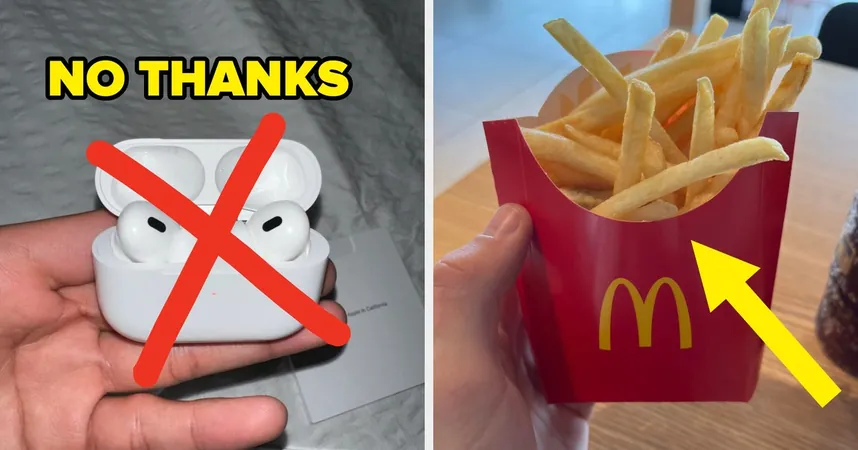
Navigating the Dangerous Intersection of Antidepressants and College Life
2024-11-11
Author: Jessica Wong
As college life can be a whirlwind of stress and social challenges, many students grapple with mental health issues such as anxiety and depression. The increasing prevalence of these conditions among college students poses critical questions regarding the safe use of antidepressants alongside common substances, especially alcohol and cannabis.
According to the latest 2023-2024 Health Minds Study, more than one-third of college students experience moderate to severe anxiety and depressive symptoms. Alarmingly, about 22% reported using prescription antidepressants within the past year, while roughly 36% have sought professional counseling—a step in the right direction for many. However, the chaotic college environment, filled with late-night study sessions, partying, and fluctuating sleep schedules, can complicate the safe use of medication meant to help manage these symptoms.
The Antidepressant-Alcohol Dilemma
The central concern revolves around the interaction between alcohol and antidepressants. While some may believe that having a drink can help ease their anxieties, the truth is far more complex. Alcohol is a central nervous system depressant that can exacerbate symptoms of mood disorders. It offers temporary relief by initially stimulating certain neurotransmitters in the brain, but this quickly gives way to depletion, potentially leaving individuals feeling worse than before.
Moreover, mixing alcohol with antidepressants can increase the sedative effects of both, impairing judgment and motor skills even further. For college students already navigating the ups and downs of academic and social life, this combination can lead to poor decision-making, increased risk of accidents, or more severe health complications.
Can You Afford to Skip a Dose?
Students may wonder if it’s acceptable to skip their antidepressant dose on days they plan to drink. The unequivocal answer is no. Antidepressants take time to stabilize in the body, and inconsistent usage can lead to withdrawal symptoms like headaches and increased anxiety. The consequences of skipping doses to indulge in a night out simply aren't worth the risk.
The Role of Cannabis in Mental Health
To make matters even more complicated, cannabis use is prevalent on college campuses, with many students turning to it as a perceived "safer" alternative to alcohol. While cannabis can provide immediate mood elevation, it also carries potential risks. Inconsistencies in THC levels and individual reactions may cause increased anxiety or paranoia.
Moreover, recent studies indicate that cannabis can impact liver enzymes that metabolize many antidepressants. This could lead to elevated levels of the medication, increasing side effects and rendering the drugs less effective.
Caution with Over-the-Counter Medications
When it comes to treating cold symptoms or mild illnesses, many students may not realize the potential dangers. Common cold medications often contain ingredients like dextromethorphan, which can raise serotonin levels when taken in conjunction with antidepressants, leading to a risk of serotonin syndrome—a potentially life-threatening condition.
Find Support, Not Substitutes
If you’re finding that your antidepressant isn't quite cutting it, resisting the temptation to supplement with street drugs or recreational substances is crucial. It's essential to consult a healthcare professional about adjusting medication routines, rather than risking a dangerous cocktail of unregulated substances.
In conclusion, navigating college life while managing mental health and medication can be tricky. Students are urged to prioritize their mental wellbeing by making informed choices about their prescriptions and any substances they might consider consuming. If you find yourself weighing risky options between partying and your health, it's a clear sign to reassess your choices and opt for what will truly benefit both your body and mind. Always seek guidance from healthcare professionals to ensure you're making the best decisions for your mental health. Staying educated and proactive could not only protect your health but potentially save your life.



 Brasil (PT)
Brasil (PT)
 Canada (EN)
Canada (EN)
 Chile (ES)
Chile (ES)
 Česko (CS)
Česko (CS)
 대한민국 (KO)
대한민국 (KO)
 España (ES)
España (ES)
 France (FR)
France (FR)
 Hong Kong (EN)
Hong Kong (EN)
 Italia (IT)
Italia (IT)
 日本 (JA)
日本 (JA)
 Magyarország (HU)
Magyarország (HU)
 Norge (NO)
Norge (NO)
 Polska (PL)
Polska (PL)
 Schweiz (DE)
Schweiz (DE)
 Singapore (EN)
Singapore (EN)
 Sverige (SV)
Sverige (SV)
 Suomi (FI)
Suomi (FI)
 Türkiye (TR)
Türkiye (TR)
 الإمارات العربية المتحدة (AR)
الإمارات العربية المتحدة (AR)